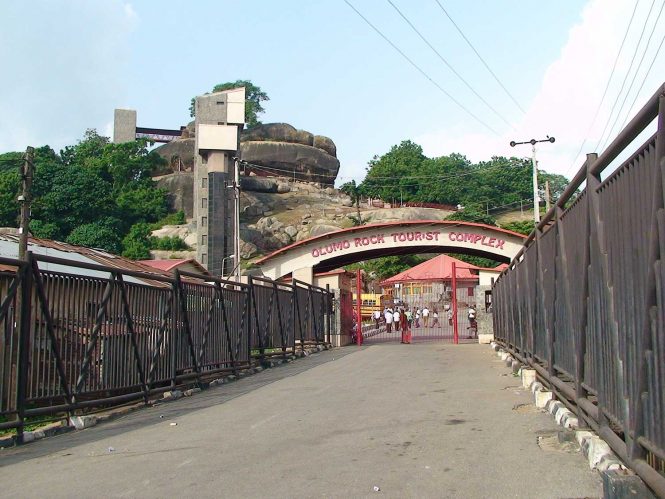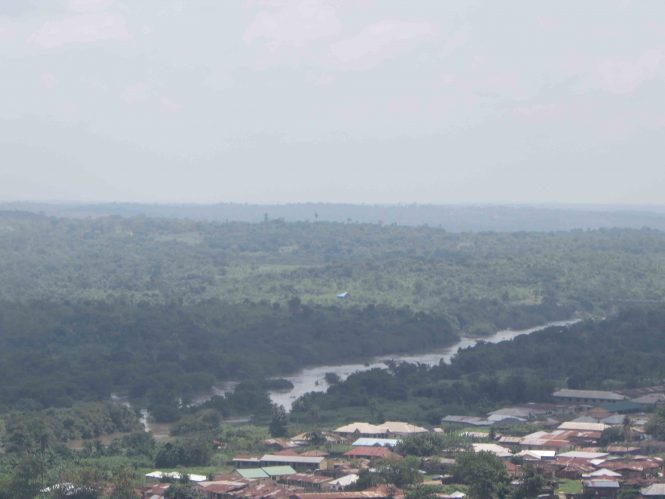by Jimoh Babatunde, Ayodeji Ayodele and Kola Tubosun | A trip to Olumo rock usually commences with a climb up the man-made stairs carved into the rock. The journey continues with climbs on irregularly sized rocks (or ladders which are now provided) through a narrow corridor that leads to the top of the rock.
Olumo Rock is a mountain in south-western Nigeria. It is located in the ancient city of Abeokuta in Ogun State, and was historically used as a natural fortress during inter-tribal warfare in the 19th century. Nigeria, an African country on the Gulf of Guinea, has many natural landmarks and wildlife reserves. Protected areas such as Cross River National Park and Yankari National Park have waterfalls, dense rainforest, savanna and rare primate habitats. One of the most recognizable sites is Zuma Rock, a 725m-tall monolith outside the capital of Abuja that’s pictured on the national currency.
Olumo is a popular tourist attraction. It provided protection to the Egba people when they needed it, and is now held in high esteem by the members of the clan. The mountain is one of the most popular tourist destinations in the heart of Abeokuta (a name which means “Under the rock” in the Yoruba language) in Nigeria. It’s at an elevation of 137 meters above sea level. Abeokuta was originally inhabited by the Egbas, who used the rock as a sanctuary at a higher elevation to monitor enemy’s advances, leading to eventual triumph in war. The town of Abeokuta eventually grew as these new settlers spread out from this location.

Abeokuta is just about an hour’s drive from the bustling metropolitan city of Lagos, providing convenient access to an array of hotels, restaurants, clubs, casinos and various nightlife activities. Lagos is also home to the closest airport to Abeokuta, the Murtala Muhammed International Airport. Most of the Hotels in Abeokuta are within few minutes’ drive from the rock.
New renovations completed in early 2006 upgraded the infrastructure of the site to include a new museum, restaurants, water fountain and the ancient Itoku market, where local artisans and traders enjoy haggling over prices just as much as the customers like to find a bargain. The Complex houses both modern and ancient facilities that have been incorporated into the Rock to make the environment one of a kind home away from home tourist destination. The market lies just outside the Olumo rock premises. It is the center of the indigenous Abeokuta industry of tie-and-dye, locally known as adire. Adire crafters, usually women both old and young, show off their designs in sheds alongside the roads. Behind these sheds are buildings where several generation of these crafters live and work.
The locals are very friendly and if asked, will often give tourists and visitors informal tours of the dyeing areas. Other popular items to watch out for include local beads, bracelets, sculptures and musical instruments like the sekere and talking drum.
A trip to Olumo rock usually commences with a climb up the man-made stairs carved into the rock. The journey continues with climbs on irregularly sized rocks (or ladders which are now provided) through a narrow corridor that leads to the top of the rock. All along the way, catch sights of carvings in the rock, cowrie-studded statues and the ancient abode of the priestesses of the mountain deity who live in huts on the rock.
Climbing the rock could be extremely challenging, most especially for the aged, the installation of this facility has greatly helped to attract more visitors to Olumo Rock, but the fun still lies in using the old stairway.
As we make our way to the top of the rock, it leaves many breathless and ready to take a break to rest on the benches under the trees growing from the rock and enjoy some clean breeze. The journey continues with climbs on irregularly sized rocks through a narrow corridor that leads to the top of the rock.

At the summit of the rock, tourists have the opportunity of having a panoramic view of the city from atop the rock. The old St. Peters Cathedral, the Ogun River, the city’s beautiful central mosque, the Alake’s palace and many others, can be seen from the top of the rock. Descending was not as difficult as climbing. At the base of the rock; one has the opportunity to visit the museum of history plain relax at the eatery.
Professional guides are available at the site or from Lagos or Abeokuta. If you start from Lagos, your tour begins with a pick up from your hotel for a 90mins drive to Olumo Rock, Abeokuta in Ogun State. After the tour of the rocks you can stop for a meal at the city of Abeokuta, before heading back to Lagos.



